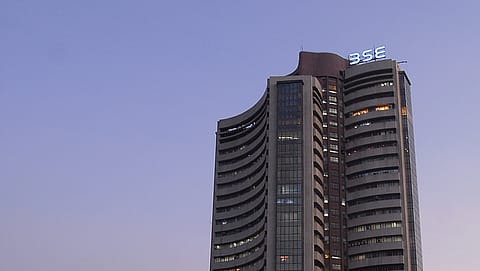Mayhem at D-Street: Investors wealth eroded by ₹15 lakh cr; 5 factors behind Sensex’s 2,686 pts crash
The unwinding of Yen carry trades, U.S. recession fear, and geopolitical tensions in the Middle-East have triggered sell-off in global equities.

The market capitalisation of BSE-listed companies plunged by nearly ₹15 lakh crore to ₹440.04 lakh crore on Monday as domestic benchmark index Sensex crashed as much as 2,686 points, or 3.3%, intraday amid sell-off in global equities. India Volatility Index (India VIX), which measures stock market volatility, spiked over 60% to 23.15, reflecting heightened uncertainty about the market outlook. Market analysts have warned that investors need not rush to buy in this correction, and they should wait for the market to stabilise.
At the time of reporting, the BSE Sensex was trading lower by 2,554 points, or 3.15%, at 78,427 level, while the NSE Nifty dived 760 points, or 3.08%, to slip below 24,000 marks to 23,957.
Early today, the BSE Sensex opened lower by 2,394 points, or 2.95%, at 78,588, after ending 1.08% lower at 80,982 in the previous session. The NSE Nifty also tumbled 415 points, or 1.67%, to open at 24,303 level.
On the BSE Sensex pack, 28 out of 30 stocks were flashing in red, barring FMCG heavyweights HUL and Nestle India. The top five losers on the Sensex were Tata Motors, Adani Ports, Tata Steel, State Bank of India, and Infosys, falling up to 7%. Among others, JSW Steel, Maruti Suzuki India, Tech Mahindra, Power Grid, and Reliance Industries (RIL) were notable losers, down in the range of 3-6%.
Here are five factors that triggered sell-off at Dalal Street
Unwinding of Yen carry trades
The spike in the Japanese Yen (JPY) versus U.S. Dollar (USD) has led to a massive unwind of Yen carry trade positions, triggering a sharp decline in U.S. and Japanese markets. The markets in Japan and South Korea were worst hit, with the Nikkei 225 index falling over 14% today after losing nearly 6% on Friday. This is the largest 2-day drop in Japanese market history, even bigger than the Black Monday crash of 1987.
Recommended Stories
According to market expert, many traders were borrowing JPY at low interest rates and converting them to USD to invest in U.S. stocks. With the recent rate hikes by the Bank of Japan (BOJ), the JPY has strengthened sharply against the USD, causing a huge unwind of these trade positions.
U.S. recession fear
The global stock market meltdown has been triggered by weak U.S. macro data, which indicated that the world’s largest economy is heading to a recession. On Friday, the U.S. stock ended lower, with the Dow Jones Industrial Average, S&P 500, and Nasdaq Composite losing 1.51%, 2.43%, and 1.84%, respectively.
"The rally in the global stock markets has been driven mainly by consensus expectations of a soft landing for the U.S. economy. This expectation is now under threat with the fall in U.S. job creation in July and the sharp rise in U.S. unemployment rate to 4.3%,” says V K Vijayakumar, Chief Investment Strategist, Geojit Financial Services.
(INR CR)
Geopolitical tensions in the Middle-East
Geopolitical tensions in the Middle-East have also injected into the global equity market. The heightened tensions in the region, led by escalated war between Israel and Iran could disrupt up to a third of global oil production, which may push fuel prices higher. The higher oil price is a major concern for a country like India, which is dependent on imports to meet over 85% of its crude oil requirements and around 50% of its natural gas requirements.
Higher valuation of Indian equities
In the recent past, higher share prices and rising retail flow have propelled Indian equity benchmarks to hit multiple record highs. As a result, valuations of Indian equities have become expensive in some cases.
Valuations in India, driven mainly by sustained liquidity flows, continue to be high particularly in the mid and smallcap segments, says Vijayakumar of Geojit Financial Services.
“The overvalued segments of the market like Defence and Railways are likely to come under pressure. The buy on dips strategy which has worked well in this bull-run, is likely to be threatened now. Investors need not rush to buy in this correction. Wait for the market to stabilise,” he says.
Santosh Meena, Head of Research, Swastika Investmart, says the global markets are witnessing signs of the first meaningful correction after an extended bull run. “Investors and traders should be cautious and avoid rushing in immediately, as better entry levels may emerge. The outlook for our market remains very bullish, but the potential for a significant correction means investors should consider taking profits where valuation concerns exist.”
“Technically, Nifty has support at the budget day low of 24,075, with the next support at the 50-DMA around 23,900. Below this, the major support lies at the 23,300 level. On the upside, 24,800-25,000 will remain a key resistance area,” he says.
Sell-off in global equities
The negative closing at Wall Street on Friday and fresh sell-off in Asian market this morning amid growing concerns about economic health of the Unites States also dented domestic market sentiments.
Asian stocks saw sharp correction today, with Japanese Nikkei 225 index crashing around 14%. The South Korea’s KOSPI plunged 8%, which prompted Korea Exchange to issue a circuit breaker to halt trading for 20 minutes. The China's Shanghai Composite and Hong Kong’s Hang Seng also fell over 1.5% each.
On Friday, Wall Street closed sharply lower, with the Dow Jones Industrial Average, S&P 500, and Nasdaq Composite losing 1.51%, 2.43%, and 1.84%, respectively.